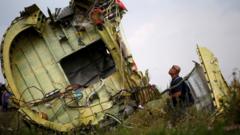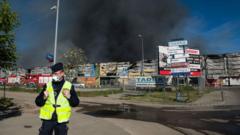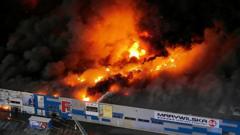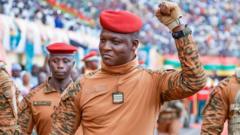High-level diplomatic talks in London focusing on a potential ceasefire between Ukraine and Russia have seen a reduction in key participants, as US Secretary of State Marco Rubio and special envoy Steve Witkoff will no longer partake. The meeting, scheduled for Wednesday, has been narrowed to senior officials from the UK, France, Germany, Ukraine, and the US, with UK Foreign Secretary David Lammy presiding over a bilateral session with his Ukrainian counterpart. Previously scheduled for Rubio and Witkoff, the attendance will now feature Gen Keith Kellogg, Trump’s Ukraine envoy.
Ceasefire Negotiations Between Ukraine and Russia Shift Dynamics in London

Ceasefire Negotiations Between Ukraine and Russia Shift Dynamics in London
Diplomatic discussions in London have shifted scope and personnel amid ongoing conflict tensions.
As the diplomatic momentum increases, speculation arises regarding Russia's willingness to consider a cessation of hostilities along existing front lines in exchange for significant concessions. However, President Volodymyr Zelensky of Ukraine has outright dismissed any discussions conceding the ownership of Crimea to Russia. During a briefing, Zelensky stated clearly that “Ukraine does not legally recognise the occupation of Crimea,” rendering any negotiations on this front futile.
Yuriy Sak, an adviser to Ukraine's Ministry of Strategic Industries, characterized it as "not productive" to entertain such proposals while maintaining that key issues, such as Crimea, are non-negotiable. He expressed that Ukrainian representatives are entering the London discussions with a "narrow mandate" focused on achieving a ceasefire that could facilitate additional dialogues.
This push for peace comes in the context of rising violence, as evidenced by a recent drone attack in Marhanets resulting in nine casualties among civilians. UK Defence Secretary John Healey reported a lack of evidence supporting any decrease in hostilities, countering claims of an Easter ceasefire by Putin, which has been described as violated.
With ongoing violence since Russia's invasion on February 24, 2022, estimates suggest countless lives have been lost, and millions displaced. The conflict, which dates back to the overthrow of Ukraine's pro-Russian president in 2014 and subsequent annexation of Crimea, underscores a deep-seated struggle for sovereignty, regional stability, and international security. As the situation evolves, the outcomes of the London talks remain uncertain.
Yuriy Sak, an adviser to Ukraine's Ministry of Strategic Industries, characterized it as "not productive" to entertain such proposals while maintaining that key issues, such as Crimea, are non-negotiable. He expressed that Ukrainian representatives are entering the London discussions with a "narrow mandate" focused on achieving a ceasefire that could facilitate additional dialogues.
This push for peace comes in the context of rising violence, as evidenced by a recent drone attack in Marhanets resulting in nine casualties among civilians. UK Defence Secretary John Healey reported a lack of evidence supporting any decrease in hostilities, countering claims of an Easter ceasefire by Putin, which has been described as violated.
With ongoing violence since Russia's invasion on February 24, 2022, estimates suggest countless lives have been lost, and millions displaced. The conflict, which dates back to the overthrow of Ukraine's pro-Russian president in 2014 and subsequent annexation of Crimea, underscores a deep-seated struggle for sovereignty, regional stability, and international security. As the situation evolves, the outcomes of the London talks remain uncertain.


















